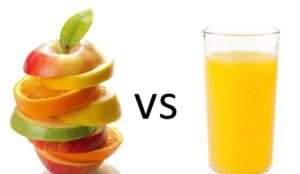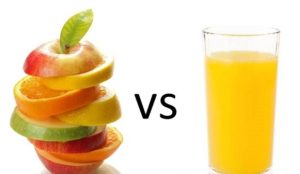During the hot Summer months, it’s a common tendency to pick up a glass of fruit juice as a healthy option during breakfast, or post exercise, or maybe with a mid-morning snack. Even when eating out at a restaurant, replacing the cola with a fruit juice helps with the guilt in thinking that at least the juice was a healthy choice of the meal. But, is it really?
A glass of fresh fruit juice in fact can cause more damage than good to your health and weight-loss goals. Even though in some cases it provides health benefits, having fruit juices also has drawbacks and you may want to consider before pouring a glass the next time. Below are the reasons:
Fruit Juice is high in calories
When you juice a fruit, it breakdowns the sugar present in the form of fructose which gets directly absorbed in your body, which is complete ‘No Go” if you are working towards weight loss or you having a high sugar condition.
Caloric Content chart for few fruits and its juices to explain this:
1 glass of fresh orange juice: 110 calories & 21g sugar
Whereas 1 orange: 62.9 calories & 12g sugar
1 glass of fresh apple juice: 120 calories & 32g sugar
Whereas 1 apple: 87.9 calories & 14g sugar
½ cup of cranberry juice: 110 calories & 28g sugar
Whereas ½ cup of cranberry: 46 calories & 4g sugar
Juices Lacks Fibre
Whole fruit contains fibre, whereas juices are devoid of any fibre. Consumption of fibre include benefits like the ability to lower cholesterol and increases satiety. Fibre also helps to slow down the entry of sugar into the bloodstream which is very important to control blood sugar levels. So, having juice instead of fruit means we are missing on the health benefits which come with fibre consumption.
Let’s compare apples vs apple juice as an example; 8 oz of juice (Needs 3-4 apples) = 0 fibre (because of the breakdown process) and 3-4 whole apple as a fruit = 12-15 gm dietary fibre which is our daily fibre requirement.
Juices can cause increase in Triglyceride levels
Fruit juices are high in sugar which results in it being absorbed quickly. This spikes blood sugar levels, insulin the hormone released goes to work by stimulating the liver to turn sugar into fat. Whereas fiber which is present in whole fruit reduces the rate at which sugar enters our bloodstream. Fruit juice doesn’t have the fibre advantage, so sugar present in juice increases our risk of having high triglycerides levels which can lead to heart related issues or diabetes & affects blood pressure.
Juices do not provide benefits of fruit skin-
Fruits edible skin is where the fruit interacts with sunlight and forms a variety of colored pigments which absorb different wavelengths of light. These pigments, including carotenoids and flavonoids, these are important nutrients that protect our body health and helps in nourishment.
For e.g.: grapes skin helps in lowering the risk of cancer. During the juicing processes fruits skin is removed and we dont get the benefits of whole fruit.
Juices don’t have the benefits of fruit pulp-
In case of Orange juice- the white pulpy part of the orange is the primary source of flavonoids. Flavonoids have antioxidant powers that provides health benefits and it helps in reducing risk of of diseases. When the pulpy white part of the orange is removed in the processing of juicing, the flavonoids in the orange are lost.
After all the discussion, there are some cases where Juices do benefit our health. Also it is a better alternative then a commercial Cola drink. so I would like to share few tips to make the juice healthier option.
1. Mind your serving sizes– If you enjoy juice, go only for fresh juice and limit yourself to one 8-ounce glass per day OR cut down to 4 ounces if you are limiting calories or sugars. Even fresh juice is not recommended to diabetic or for weight watchers.
2. Make your juice at least half vegetables– Vegetable juice is always lower in sugar than fruit juice. Add plenty of dark leafy greens and even herbs & spices like cinnamon, ginger, cilantro and parsley which helps in reducing spikes in blood sugar levels.
3. Add ice– Adding a few ice cubes to your juice will not only keep it cooler, it’ll increase the volume, so you will feel like you’re drinking a larger juice and consume fewer calories. Adding ice can also slow you down when drinking.
4. Try fruity water/Detox water instead– Dilute your juice with water or infuse water with fresh fruits.
Suggestion-Do limit the juice intake for growing kids as the sugar rush can cause them to be hyper, rather opt to give them a whole fruit to eat which is better snacking option then a junk eating. I normally suggest fruit juices to my Weight gain clients so next time before having a glass of juice do decide what is your health goal.
Better alternative to Juices would be our traditional options like Nimbu Paani, Coconut water, infused water, herbal teas, Chaas, Saunf-gud ka paani, Aam panna & others to quench your thirst this summer.
The Bottom Line its okay to have a juice once a while as a beverage & in small portion is okay, but don’t fall for the hype that juicing your fruits and vegetables is the same as eating them.
Be happy Be healthy always!!!

